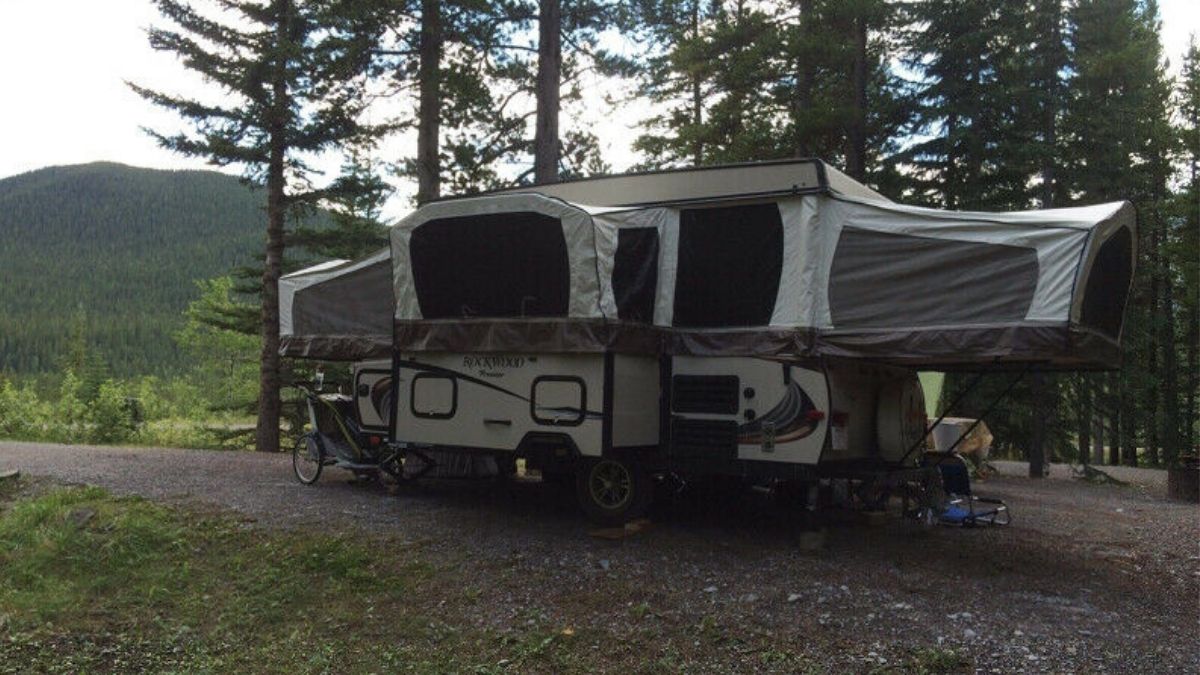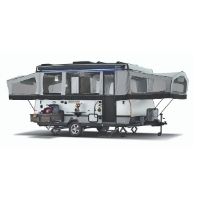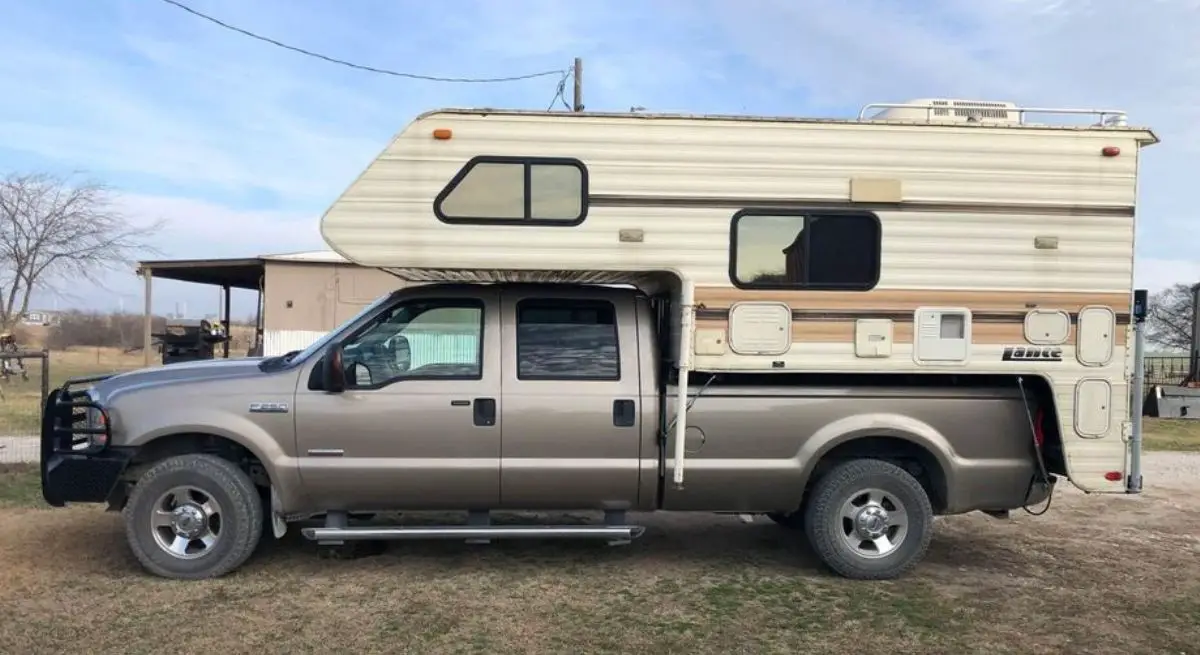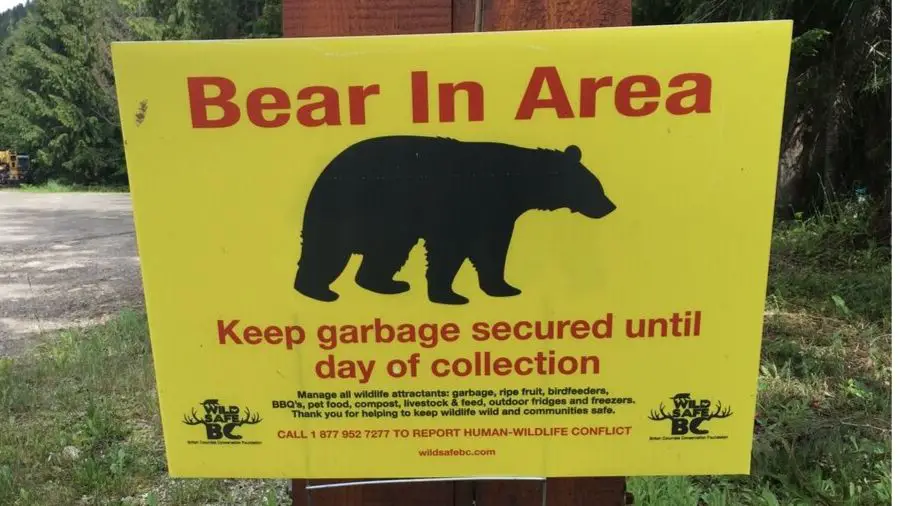Not quite a flat-bed, not quite a travel trailer, what is a pop-up tent camper?
A pop-up tent camper also known as a pop-up trailer or even a tent trailer, is a collapsible travel trailer where the upper section folds down. Pop-up campers’ range in size from 8’ to 16’ long and are classified by their box size. This is the interior floor space (length) before you open out any tented areas.
This ability to fold-down means the camper is lighter and easier to tow, but still has some of the main features of a travel trailer.
There are two main types:
- Tent-like popup
- Hard-side pop-up
Overall living space can often double when fully opened. Hard-sided pop-ups do not tend to have as much added space.
Pop up campers are often purchased by those new to RVing, who want to explore this style of camping, without an initial hefty outlay. One main advantage is that your family’s SUV may well be sufficient to tow a pop up camper. A Honda Pilot, for example, can tow to 3500lbs, above the weight of an average pop-up. We’ll need to investigate the towing capacity of your vehicle, compare with the weight of a range of pop-ups, and also allow for extra loaded items and their weight.
Let’s explore the basic features of a pop up camper, but models vary hugely. The towing capacity of your existing vehicle plays a role in determining the right pop up for you, so we’ve added links to several articles that will help you determine the right option for you.
Basic features of a pop-up tent
camper
As you’d expect, a pop-up camper’s exact features are affected primarily by price. A new pop-up tent camper ranges from about $7,000 to well over $20,000. The average price is around $12,000. Balancing cost and weight is a key consideration with pop up campers. You can find more details on pricing for tent trailers in this article.
Evaluate carefully what features you and your family really need. Think about:
- How many people will need to sleep in the pop-up camper?
- Do you need to cook inside the camper, or will you be grilling outside?
- What kitchen features do you need? Refrigerator, stove-top, microwave, oven …?
- What bathroom features do you need? None? Portable toilet? Full shower room?
- Will you be using the pop up camper in cooler, wetter weather?
3 Price Points for Pop-Up Campers and What you get
Entry Level
Price: $$
You get the basics, sometimes its as basic as a tent on a platform trailer frame.
- box base
- hard roof
- Awning
- soft sides (usually vinyl or canvas)
- pull out bunk(s)
- fold down dinette table, with bench seats
- some storage
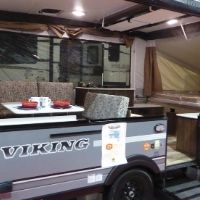
Mid Range
Price: $$$
Pop Ups in this price point will get everything in the entry level and you a little more typically luxuries
Higher End
Price: $$$$
On the higher end of pop up trailers, you will get almost the same luxuries as trailers and motorhomes, but with a softwall.
- Heating
- Air Conditioning
- Shower
- cable hook up
- microwave
What is The weight of A pop-up tent camper?
It’s likely that one of the features attracting you to a pop-up camper, is the idea that your existing vehicle can double as your tow vehicle. Before really worrying about the specific tent camper that’s best for you, make sure you understand the towing capacity of your vehicle. Here’s an article on towing your tent trailer.
Using the vehicle manufacturer’s website and vehicle VIN, you should be able to find towing details. Dissect these numbers carefully. Remember to allow for passengers in your tow vehicle, luggage, and any items you store in the pop up camper. You can quickly add 1000-2000lbs of load. Don’t forget that this load includes what you put into the tow vehicle too, plus water in the tanks, bike carriers, etc. If you need help thinking about the overall weight then read our article on What does a pop up camper weigh?
Aim to stay about 1000lbs below the maximum towing capacity for your vehicle. That gives you some room for extras and won’t overly tax the towing vehicle.
Broadly speaking there are 3 weight ranges for pop up campers:
- Below 1000lbs – these are mini-pop ups that can be towed by a range of vehicles. Good for 1-2 people.
- 1000-2000lbs- these models often have 2 pop-out sleeping areas and living space with a basic kitchen. Good for a small family.
- Over 2000lbs- obviously these models have more space and work well for slightly larger families, who also might need more storage. Trailer breaks are important once you get up into this weight category, and many family vehicles will not be able to tow these larger campers.
For a much more detailed look at what you need to know to safely tow a pop up camper, read our related article. It takes you through all the steps, helps you understand the different weight related numbers and terminology, and covers possible tow vehicle and pop up camper combinations.
Once you know the weight limit for your pop up camper, your price bracket, and the key features you want, then you can start investigating specific models.
Advantages of a pop-up tent camper over other styles of trailers and RVs
We’ve already explored two of the key advantages that pop up campers have over other trailers and RV’s – purchase cost. and tow vehicle options.
There are several other advantages too.
Pop Up Camper Storage
The dimensions of a typical pop up camper mean that you may well be able to store your unit in your garage. Most pop ups are about 7’6” wide and 4’6” high when collapsed, though models clearly vary. With lengths ranging from 8-16’, your pop up camper will fit a standard single garage that’s 12’ by 22’.
Indoor storage will increase the lifespan of your pop up camper and using your garage saves the cost of potential covered, over-winter storage.
Fuel Economy Of Towing A pop Up Camper
As they are lighter and easier to tow, pop up campers reduce your gas costs compared to other RV’s.
Ease of towing A Pop Up Camper
If you are new to towing, then the lighter loads provide a good introduction. There is also the advantage that your tow vehicle will be familiar to you.
Disadvantages of a pop up camper
There are of course some drawbacks with pop up campers in that they are cold when it is cold and hot when it is hot. They also lack amenities typically such as bathrooms and air conditioning.
Space Of a Pop Up Camper
This is a subjective issue. Compared to the same footprint travel trailer, you may find more floor space in a pop up camper due to the fold-outs. For some pop up campers the floor space can even double compared to the collapsed version. However, this space is often filled by a mattress and so doesn’t add actual practical floor space. The headroom is also less in a pop up camper compared to a travel trailer with the same sized box.
The absence of taller storage units and the eye-level units common in travel trailers, also means the overall storage options are less in a pop up camper.
Privacy and safety Of A Pop Up Camper
Since the fold-outs on a pop up camper are generally vinyl or canvas, the privacy level is similar to tent camping. If you are considering ‘upgrading’ from tent camping to a pop up camper then think about what you’re hoping to gain. A soft sided pop up camper might not be the best choice if you’re looking for more privacy and noise reduction.
The canvas also means that you need to approach bear safety as though you were tent camping. Find out more on pop up campers and bears here.
Heating and Cooling In A Pop Up Camper
Although there are pop up camper models that have heating and/or cooling options, these are top end features. The soft fold-outs also mean that the level of insulation is below that of a travel trailer and hence the energy used to run heating, or an air conditioning unit, increases.
Maintenance Of A Pop Up Camper
Cleaning and maintaining any RV is a given, but the canvas and vinyl sections of a pop up camper need focused attention. For example, if the camper is packed away with damp fold-outs, then you’ll quickly see mold or mildew. Open the camper out to direct sunlight as soon as you can. This will dry the canvas, but also inhibit mold growth.
Set-up time Of A Pop Up Camper
A pop up trailer will require leveling and setting similar to a travel trailer. However, pop up campers then have additional steps that add time to setting up and taking down. These could include:
- unlatching and cranking the roof
- extending the fold-outs
- checking the canvas
- adding fold-out supports
- adding any internal supports
- releasing and positioning the camper’s door
- connecting water and/or propane
Additional Questions
Is a pop up camper ok in the winter?
A pop up camper will not provide the same weather barrier as a travel trailer or motorhome. But with care of the canvas and good camping gear, you can certainly use your pop up camper in the winter months as long as the water storage tanks are kept warm.
As with any winter camping trip, thorough planning and the right equipment will help ensure a safer adventure. For your pop up camper, take special note of canvas care, assume you’ll suffer electricity outages, and protect pipes.
What are the alternatives to a pop-up tent camper?
If you are considering a pop-up tent camper, then it would also be worth investigating alternatives.
- Truck bed tent – as it sounds, this tent sits in the flatbed of your truck. Some also include extensions that add a tent at ground level too.
- Car roof-top tent – fits on your car’s roof-rack and opens quickly to give a tent space accessible by a ladder
- A-frame campers – these are a kind of hybrid sitting between pop up campers and true travel trailers. The main advantage is that they fold down and so mirror many of the advantages of a pop up camper
- Inflatable trailer – this is a small trailer with, as the name suggests, a tent that inflates quickly.
Summary
Pop up campers are entry-level, towed recreational vehicles. They vary greatly in size and price. Take time to think about what you’re looking for in your pop up camper. By balancing features, cost, weight, and your tow vehicle’s capabilities you can find a match that meets your budget and provides a base for your outdoor adventures.

